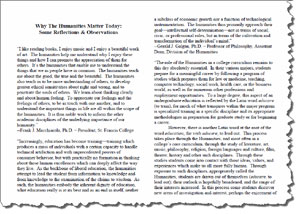
As Tague writes in a coda to the brochure,
Humanities Day and these statements give living expression to the quiet voice murmuring through the body of humanists at St. Francis College and beyond. Humanistic study is not solipsistic labor in a silent cubicle. Rather, it is part of and the catalyst for engaged, hopeful, active community. I refer to Charles Dickens for an illustration to explain my purpose in representing the many voices today, and in this brochure, which address Why The Humanities Matter. In Great Expectations it is the uneducated and humble Joe who informs the vain and ambitious Pip, “life is made of ever so many partings welded together.” Humanities Day and this brochure matter for the same reason that the humanities have always mattered: however tenuously, and whatever the friction, they bond together all of us in a vitally meaningful exchange.
Today, ten years later, Tague adds in a personal reminiscence (sent to 4Humanities) his reflections on the resonance of that Humanities Day in the aftermath of 9/11:
Over ten years later, the experience of Humanities Day is indelibly inked in my mind with 9/11. St. Francis College is across the river from lower Manhattan, and the smoke from the fiery towers permeated our campus. The subway tube that connects the Battery with Court Street funneled for many months the fumes from ground zero into Brooklyn. My wife was there and felt the impact of the first plane; smoke penetrated her eyes. She fled the city to make a panicked eight mile trek home on foot. When crossing the Brooklyn Bridge, everyone rushed back to the burning city in fear that the bridge was under attack. Many hours later my wife returned home, her feet swollen with red blisters, her skin, hair, and clothes covered in soot. The memory of that day is yet more intense since we had brought home from Lithuania our daughter only seven months earlier. What if my wife had not come through? Many others were not as lucky, and in our Bay Ridge neighborhood, to this day, there are grim reminders – many streets are named after people who did not return that night. Some of the statements in the Humanities Day brochure make direct reference to 9/11 – many others, if read between the lines, do so as well. The feelings are still sharp edges in our lives. New York Times columnist Joyce Purnick has said that each New Yorker lives 9/11 regularly. How does one grapple with such memory-fresh catastrophe but through contact with the arts, music, and literature – as the statements in the Humanities Day brochure attest. The arts bring people together and remind us, as Aristotle says (borrowing phraseology from the American philosopher Martha C. Nussbaum), that our goodness is in our fragility.
The Humanities Day event at St. Francis College was funded by the New York Council for the Humanities and the National Endowment for the Humanities.